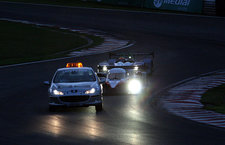Difference between revisions of "Endurance racing"
m |
m |
||
| Line 1: | Line 1: | ||
{{X}} | {{X}} | ||
| + | |||
| + | |||
'''Endurance racing''' is a form of motorsport which is meant to test the durability of equipment and endurance of participants. Teams of multiple drivers attempt to cover a large distance in a single event, with participants given a break with the ability to change during the race. Endurance races can be run either to cover a set distance in laps as quickly as possible, or to cover as much distance as possible over a preset amount of time. | '''Endurance racing''' is a form of motorsport which is meant to test the durability of equipment and endurance of participants. Teams of multiple drivers attempt to cover a large distance in a single event, with participants given a break with the ability to change during the race. Endurance races can be run either to cover a set distance in laps as quickly as possible, or to cover as much distance as possible over a preset amount of time. | ||
Latest revision as of 11:39, 25 August 2009
Endurance racing is a form of motorsport which is meant to test the durability of equipment and endurance of participants. Teams of multiple drivers attempt to cover a large distance in a single event, with participants given a break with the ability to change during the race. Endurance races can be run either to cover a set distance in laps as quickly as possible, or to cover as much distance as possible over a preset amount of time.
One of the more common lengths of endurance races has been running for 1000 km, or roughly six hours. Longer races can run for 1000km, 12 hours, or even 24 hours. Teams can consist of anywhere from two to four participants per event, which is dependent on the driver's endurance abilities, length of the race, or even the rules for each event.
At club level racing, a race taking either 30 minutes or 1 hour could be considered as an endurance race.
Origins of endurance racing
The first 24 hour race to take place on a closed course was at Brooklands, eleven days after its opening in 1907. This incurred the wrath of local residents and would lead to the Double Twelve race. This format meant the race took place for 12 hours each between 8am to 8pm and between it, the cars were locked up overnight to prevent maintenance work performed on it.
Automobile endurance racing
Triple Crown
In automobile endurance racing, three events have come to form a Triple Crown. They are considered three of the most challenging endurance races over the decades: the 24 Hours of Daytona, 12 Hours of Sebring, and 24 Hours of Le Mans. Ken Miles came close to winning all three events in the inaugural year for the 24 Hours of Daytona, but would lose out at Le Mans due to an error in his team orders, relegating him to second.
The last car to win all three events in the same year was the Porsche 962 in 1986. However, since 2003, Daytona has fallen under different rules from those used at Sebring and Le Mans, meaning that car regulations make it impossible for any racing car to win all three events. Drivers are still able to run all three events, although none have yet to win all three in the same year.
Due to the regulations, the American Le Mans Series' Petit Le Mans has become a third endurance event to match the regulations of Sebring and Le Mans.
Notable automobile endurance races
Some of the more famous endurance races include:
- 1000 km Buenos Aires
- 1000km Monza
- 1000km Nürburgring
- 1000km Spa
- 1000km Suzuka
- 24 Hours Nürburgring
- 12 Hours of Sebring
- 24 Hours of Daytona
- 24 Hours of Le Mans
- 24 Hours Spa
- Silverstone Britcar 24 Hours
- Bathurst 1000
- Mil Milhas Brasil (Mil Milhas Brasileiras)
- Petit Le Mans
Motorcycle endurance racing
In the early days of endurance racing cars and motorcycles raced side by side, but the two were soon separated.
The most famous motorcycle endurance race, the Bol d'Or, was first run on the circuit of Vaujours, near Paris in 1922. Only one rider was permitted per bike and there was no stopping other than for refuelling.
Motorcycle endurance racing began to expand after the second World War as new races began to emerge, among them the 24 Hour Race in Warsage, Belgium in 1951, the 24 Hours of Montjuich in Barcelona in 1957, 24 hours in Monza, Italy in 1959, and 500 Miles of Thruxton in 1960.
1960 also saw the inaugural FIM Endurance Cup. Initially made up of four races, Thruxton, Montjuich, Warsage and the Bol d'Or.
The popularity of motorcycle endurance racing increased in the 1970s with the arrival of four-cylinder machines from Japan. In 1976 the FIM Endurance Cup became the European Championship and in 1980 a World Championship.
Notable motorcycle endurance races
Motorcycle endurance classics:
